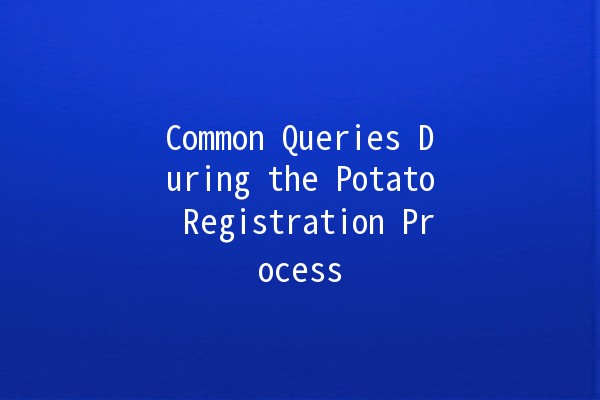Understanding the Potato Registration Process
When embarking on a new culinary adventure, the "potato registration process" may not be a term that you immediately recognize. However, in many contexts—be it within agricultural practices, culinary certifications, or even in technology sharing—the registration of potatoes (or any other produce) is vital. It ensures quality, safety, and standards compliance.
With that said, many individuals often encounter various challenges or common queries while they are in the process of registering their potatoes, whether for personal use, agricultural purposes, or for culinary applications. Below, we will address some of the most frequently encountered questions, while also providing practical advice and productivityenhancing tips.

Key Tips to Enhance Your Registration Success
Different regions have distinct regulations concerning agricultural products, especially if they are being introduced into market systems. Familiarizing yourself with governmental guidelines and agricultural standards can preemptively answer many questions you might have during registration. Knowledge of the regulations helps streamline the entire process, allowing you to prepare the necessary documentation proactively.
Example: If you’re in the U.S., familiarize yourself with the USDA guidelines for potato registration, which may include specific labeling and quality standards.
A wellorganized documentation set is crucial for a successful registration process. This can include everything from proof of purchase, origin statements, quality certifications, and any research or development documents related to how the potatoes were cultivated.
Example: Create a checklist of required documents before initiating the registration. Include items like: growing logs, soil quality test reports, and pest management records.
With the advancement of technology, many agricultural departments and regulatory bodies have launched online platforms to facilitate faster registration. Utilizing these digital formats can make your process smoother and allow for better tracking of your submission status.
Example: Register through an online portal for agricultural certifications that provides a stepbystep guide and realtime application tracking.
If you find yourself perpetually confused about the registration process, it might be time to consult with an agricultural advisor or a legal consultant specializing in food products. They can help clarify any ambiguous rules and recommend best practices to follow.
Example: Hire an agricultural consultant who has experience with potato registration to ensure all your bases are covered.
After submitting your registration, remember to follow up with the corresponding authority. Keeping open lines of communication can prevent delays and ensure that you are promptly informed should any issues arise during your application’s review.
Example: Set reminders to reach out to the registering body after two weeks of submission to confirm that your application is being processed.
Frequently Asked Queries on the Potato Registration Process
The essential requirements for potato registration can vary widely based on local regulations; however, they typically include:
Proof of seed identity and source
Quality assurance certifications
Compliance with phytosanitary requirements
Documentation of agricultural practices
Understanding these basic prerequisites can help expedite your process.
While the duration can differ depending on jurisdiction and the specific body handling the registration, most processes may take anywhere from a few weeks to several months. Factors affecting this timeline include:
The completeness of your submitted documentation
The volume of applications being processed at the same time
The requirement for additional information or inspections
Yes, potatoes can be registered for both personal (home gardening) and commercial purposes. Nevertheless, the requirements might diverge substantially. Commercial registration may necessitate more extensive records and adherence to stricter standards.
Should your registration application get rejected, it is crucial to:
Review the rejection notice for specific reasons
Engage in dialogue with the reviewing body to identify potential remedies
Correct the issues highlighted before reapplying
Being proactive in resolving these matters can allow for a smoother process in subsequent attempts.
Most regulatory bodies impose a fee for processing registration applications. This fee can vary depending on the scope (commercial or personal use) and the specifics of your application. It's prudent to verify the costs ahead of time.
Experiencing technical difficulties is often a frustration of online applications. When this happens:
Look for FAQ or support sections on the registration portal.
Contact technical support directly for assistance.
Document any errors for future reference or when reaching out for help.
Having a reliable method to address technical challenges will keep you from losing valuable time during registration.
: Streamlining Your Registration Journey
Navigating the potato registration process can be daunting at first, but with the right knowledge, preparation, and resources, you can enhance your chances of success significantly. Prioritize understanding local regulations, gathering comprehensive documentation, utilizing online resources, consulting experts when necessary, and maintaining communication with regulatory authorities.
Each small step you take can lead to a smoother and more efficient registration process. Whether you're planning to grow potatoes on your own or are not sure where to start with commercial ventures, leveraging these insights will allow you to register competently and confidently.
By addressing common queries and utilizing the productivityenhancing techniques outlined, you can ensure that your registration experience is as seamless as possible. Now, go ahead and take that exciting step toward becoming part of the potato community! 🍽️